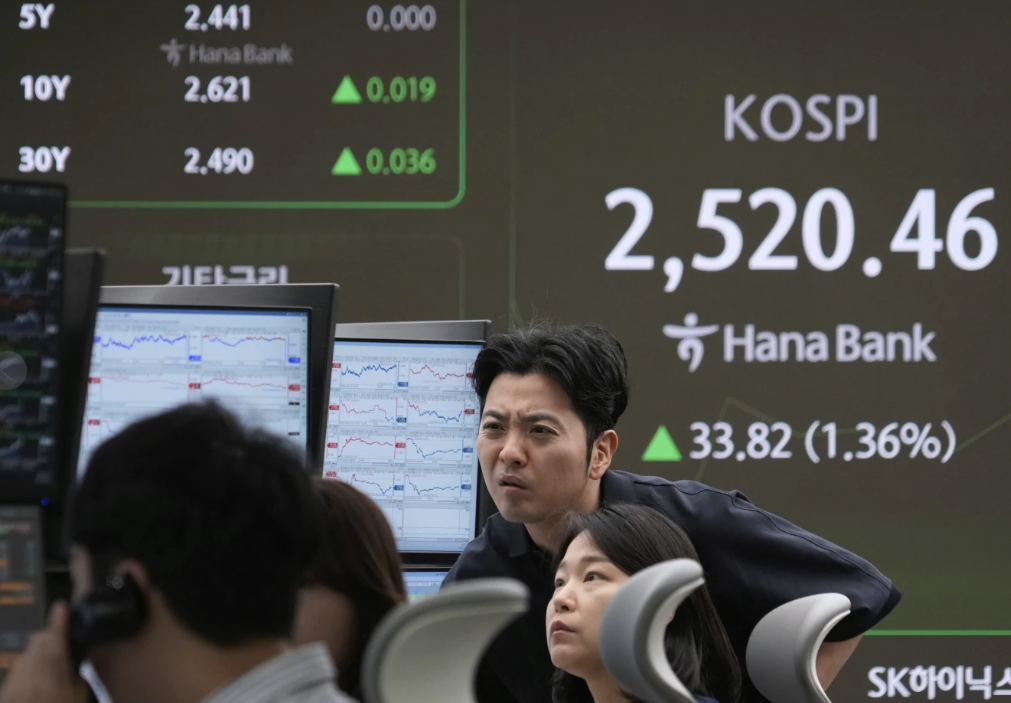Global stock markets mostly moved higher on Wednesday after U.S. President Donald Trump signaled he does not plan to remove Federal Reserve Chair Jerome Powell from his position. This assurance helped calm investor nerves, adding to optimism sparked by positive signals on U.S.-China trade relations.
In Europe, France’s CAC 40 surged 2.1% to 7,480.99, and Germany’s DAX jumped 2.5% to 21,820.14. London’s FTSE 100 rose 1.6%, reaching 8,461.24. U.S. stock futures also pointed to gains, with the Dow up 1.5% at 39,960.00 and S&P 500 futures rising 2.0% to 5,421.75.
Asian markets closed broadly higher as well. Japan’s Nikkei 225 advanced 1.9% to 34,868.63, while Australia’s S&P/ASX 200 rose 1.3% to 7,920.50. South Korea’s Kospi added 1.6%, ending at 2,525.56. Hong Kong’s Hang Seng rallied 2.4% to 22,072.62, though China’s Shanghai Composite dipped slightly by 0.1% to 3,296.36.
Trump’s reassurances came after previous remarks suggesting he might fire Powell due to frustration with the Fed’s pause on rate cuts. However, on Tuesday he clarified, “I have no intention of firing him,” helping ease concerns over political interference in monetary policy.
Markets also reacted positively to U.S. Treasury Secretary Scott Bessent’s comments suggesting that the tariff conflict with China is “unsustainable,” and he anticipates a “de-escalation” of the trade dispute. His remarks added to investor confidence that trade tensions may soon ease.
Analysts noted that market direction remains highly sensitive to Trump’s evolving stance on trade. “Of course, markets will continue to listen out for the latest White House rhetoric on tariffs and any hints of upcoming trade deals,” said Tim Waterer, chief market analyst at KCM Trade.
Despite this optimism, some uncertainty lingers. Many on Wall Street caution that without progress on trade agreements, recession risks could rise. Meanwhile, the International Monetary Fund downgraded its global growth forecast for the year to 2.8%, down from 3.3%.
Strong earnings from major U.S. firms have helped lift sentiment. However, Tesla was an exception. After markets closed Tuesday, the company reported quarterly profits of $409 million, a steep drop from $1.39 billion the previous year—well below analyst expectations. Tesla’s performance was weighed down by widespread protests, vandalism, and a consumer backlash tied to CEO Elon Musk’s controversial cost-cutting efforts linked to U.S. government contracts. Musk later announced he would shift focus back to leading Tesla operations rather than engaging with political issues in Washington.
Oil prices also rose, with U.S. crude up 80 cents to $64.47 a barrel, and Brent crude gaining 81 cents to reach $68.25. In currency trading, the U.S. dollar slipped to 141.87 yen from 142.37, while the euro edged up to $1.1390 from $1.1379.














